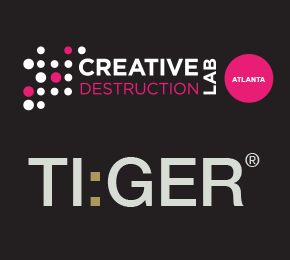At the Georgia Tech Scheller College of Business, practicums are a vital way for students to gain in-depth knowledge and insights into real-world issues. Scheller College’s TI:GER (Technology Innovation: Generating Economic Results) program offers a Global Technology Innovation Practicum that is uniquely positioned to provide students with hands-on experience in tech innovation and strategy to help solve the most pressing problems companies face.
Jonathan Giuliano, executive director and academic director of TI:GER, academic lead of CDL-Atlanta, and professor of the practice in strategy and innovation, led this unique practicum in its inaugural offering this summer semester. This is the only practicum to date giving students the opportunity to work directly with tech companies offering public health and economic recovery solutions in immediate response to the Covid-19 pandemic.
Partnering with the Creative Destruction Lab-Atlanta
The practicum partnered with the Creative Destruction Lab (CDL), an objectives-based global program that helps seed-stage science and technology-based companies transition from science projects to scalable and financeable start-ups. CDL-Atlanta is the only CDL site in North America and it is strategically situated within the Scheller College.
Gregory Ray, operations director at CDL-Atlanta, helped organize the practicum, coached and mentored TI:GER students throughout the course, attended all online class sessions, and directed the collaboration with other CDL sties.
When the pandemic hit, CDL moved quickly. CDL-Recovery provided venture capitalists and entrepreneurs in the public health sector the chance to partner with Scheller graduate students to work on Covid-19 solutions.
Merging Research with Business
Gabriel Cahn, a second-year dual-degree MBA and PhD student in mechanical engineering, had a few reasons for participating. Enrolling in the practicum would give him time to work on research for his PhD in flexible electronics as well as earning MBA credit. Plus, in collaborating with CDL-Recovery, he would be working on a public health issue that could have global ramifications. Together with his interests in technical management and strategy, the match was perfect.
“I thought of no better time to observe strategy than in seeing how this global event is impacting every aspect of business and human interaction,” he said. And he was impressed by CDL. “It’s like TI:GER on steroids,” he said.
Cahn was matched with a French company working on developing a five-minute Covid-19 test that is expected to enter the market between late 2020 and early 2021. Cahn compared his experience to an internship rather than a practicum. “I felt like I was working for the company and I felt I had a significant impact there,” he noted.
Bringing Ideas to Market through Collaboration
Another unique aspect of the practicum is that Scheller MBAs collaborate with business students from other CDL universities throughout the project. Ginny Hodges, an Evening MBA student, said the collaboration was an asset to the practicum.
“I had a stellar partner from the University of Toronto and got to work with her, which was an additional piece of international exposure and partnership that I haven’t had the opportunity to do in my MBA experience so far,” she said.
Hodges worked with a venture that is developing a strategy for a Covid-19 diagnostic kit based on the technology they validated during a prior virus outbreak.
“When the professor came to us with this opportunity to participate in the Covid-19 recovery workstream, I thought, ‘What could be a more meaningful and relevant way to immediately apply what I’d just been learning in TI:GER than to come up with solutions to this global health and economic crisis?’” she stated.
Building Bridges to a New Career
Paige Cruver was matched with a company developing a transdermal patch to deliver drugs through the skin, including a potential application for a vaccine against Covid-19. She is a second-year MBA student with a B.S. in biology and a Master’s in Public Health. She wanted to get back into public health while retaining her information technology experience and felt an MBA would be the bridge that connected her back to the healthcare industry.
“I’m nearing the end of my MBA journey and this experience is one that has had a profound impact on me professionally and personally,” she stated. “We are all living history right now, and the opportunity to actively contribute to public health and economic recovery efforts through CDL is something that a traditional classroom or a case study simply can’t capture.” Her work helped the company’s founders decide whether to move forward with their product.
“The CDL staff, mentors, and intake process, as well as the startups that participate, are proof positive that the business world can be nimble – and thoughtful – in creating, applying, and managing innovation in an ever-changing world,” she said, summing up the impact of the partnership between the Global Technology Innovation Practicum and CDL-Atlanta’s initiatives.
